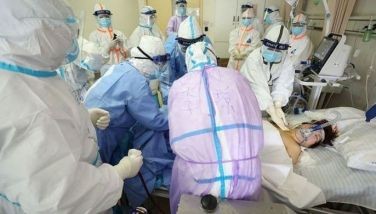Syrian refugees in Lebanon face bitter winter
BAALBEK — Shivering in the snow, Syrian Aisha Mohammad looked at the last-minute charity that saved her children from freezing during the smack of a particularly tough Lebanese winter: a wood-burning stove complete with twigs and garbage to ignite in hopes of warming her drafty tent in an icy eastern plain.
Still, her seven children quake from the cold in their donated, bright plastic rain boots, even as they build snowmen resembling their own skinny selves. Since fleeing Syrian government shelling in the northeast province of Raqqa nine months ago, their playground has been here, among the rows of crowded tents they call home.
"We would have frozen to death," without the aid, said the tall, 40-year-old wife of a day laborer who also lives at the camp as she held her runny-nosed four-year-old daughter, Rawan.
Like tens of thousands of impoverished refugees living in tents, shacks and unfinished buildings throughout Lebanon, the family faces a miserable winter as aid organizations scramble to meet their needs, constantly overwhelmed by ever-more people fleeing the Syrian conflict, now entering its third year.
Some one-third of Syria's pre-war population of 23 million has been displaced, with 2.3 million now refugees, mostly in neighboring countries.
"This is the biggest winterization effort that the UN and partners have ever done in the world," said Roberta Russo of the UN's refugee agency. "But still, the scale of the crisis and the number of people coming is so much," she said.
Some 1.4 million Syrians live in Lebanon, including 842,500 officially registered with UN, charities who are rushing to distribute aid to the most vulnerable — around half a million people.
This past week, they handed out blankets, mattresses, kerosene heaters, winter clothes, plastic tarps and fuel coupons, hoping to stave off the worst of a battering storm called Alexa that hit Lebanon, the Palestinian Territories, Turkey, Israel and even the deserts of Egypt with rare snow and rain.
Syrian refugees said the Lebanese army joined the efforts, handing out blankets and mattresses from the back of jeeps. Some kindly neighbors let refugees siphon off electricity and gave them used TV sets and heaters to help pass the time.
On yesterday, the UN's World Food Program said it began airlifting aid into northeastern Syria, trying to reach displaced families with deliveries that had been delayed by the winter storm. The WFP said it hoped to send in enough food for 30,000 people for a month.
In Turkey, foreign ministry official Yunus Bayrak said workers had insulated tents and delivered winter clothing to refugees. But he said conditions in camps just across the border in Syria were likely to be worse.
Charity officials in Lebanon said they planned to distribute more aid, particularly to the 120,000 Syrian refugees living in 430 makeshift encampments scattered throughout the eastern Lebanese mountainous plain of the Bekaa.
Freezing air crept through holes in Mohammad's burlap tent, outside which lay fuel for her Lebanese-donated stove: a tattered shoe, twigs, old clothes and plastic bags.
"It's for the fire," she said, acknowledging that the toxic smoke was making her children sick. But she had little choice, particularly when she needed to put them to bed. "I don't know if the children sleep from dizziness or hunger," she said from under a purple headscarf.
Some refugees said municipal officials have seized part of their aid. There was no way of proving the claims, but few appeared to have kerosene, which aid organizations distributed to registered refugees this week in exchangeable coupons.
Nearby, Mariam al-Hamad, 52, burnt an old shoe in her newly donated portable heater as her husband, an amputee, sat nearby. "We ask for heating, that's all," she sighed.
The cold has frozen the site's water source, and the men said they were melting snow for drinking water.
Nearby, a boy ran with a plastic bag peeking from the top of his shoes — a cheap waterproofing tool. Other children appeared to have missed out on the winter clothes donations and wore only thin pants and layers of shirts.
In another encampment in the town of Arsal on the Lebanon-Syria border, hundreds gathered around a center run by the Danish Refugee Council, where workers distributed emergency fuel coupons as boys sledded gleefully down a nearby a hill on a plastic sheet.
Residents sat on mattresses in the snow to take advantage of a few hours of scarce sunshine. A group of boys crouched around a pot of cooked wheat, eating sloppily.
"Look! I have a hole in my pants!" shouted Abdullah, 12, pointing to his torn clothing.
Some refugees appear to have slid through the cracks.
Anwar Abdul-Qader, 40, said he had arrived in Arsal two weeks ago with his 11 children but still hadn't received aid.
But friends organized a tent by moving its former inhabitants into other dwellings. For food, Abdul-Qader's children gathered at their better-off neighbor, Abdul-Rahman. He too complained of the cold and thin blankets, but said he had sold part of his fuel ration to buy yerba mate, a popular South American tea-like brew.
Abdul-Qader sighed.
"One complains about not having enough blankets. What about those who have none?"
- Latest
- Trending
































